Created: 2024-01-28 11:52
Ultra X Morocco 110k. 16-17th of November, 2024.
Training
I started to train officially on 2024-01-22.
Before that I had run around a total of 250km starting 2023-11-13.
I will be doing the Runna 50k 16 weeks cycle ending the beginning of May, and do a 110k 16 weeks cycle, ending on race day. I have around 10 weeks in between both cycles to rest and do my own training.
My longest run so far has been on the 14th of January. 16k, ~6’08” pace, 487m elevation gain.
Besides that I’ve been training in the gym for the past 6 months pretty much consistently. 3 days a week, full body routine. I will switch to 3-4 days a week with more focus on legs.
After these three months of consistent running I’ve done so far, I can already see improvement in pace and endurance.
1st Cycle
A 16 weeks training cycle with Runna’s 50k plan. I chose the Intermediate option, since I hadn’t run any (half)marathon thus far.
Week 1
The training plan includes easy recovery runs, paced runs, speed intervals, and a weekly long run. Coupled with more leg focus at the gym, I ended the week more tired than ever before.
Week 2
The training plan I was following before only included one legs exercise per day, that’s three per week.
With this new plan, I’m doing a few on every training session, and the exercises are also more varied. Two weeks in I can already notice a difference. I feel more tired, but it’s strengthening muscles that I wasn’t engaging before.
Week 3
Enjoying the rotation of different running workouts. My legs (mainly quads, but also calves) are constantly tired. It’s definitely more intense than only running at the same pace 5-8k every day.
Week 4
I can see the improvements in terms of speed thanks to interval workouts. I had done a few before starting this cycle but not much.
For example, last week’s long run was a 12k with a Negative split, faster on the last 4k. My faster kilometer was the 11th.
I’m also back to the flat lands of The Netherlands, which is easier for easy and long runs but also much more boring.
Week 5
Fatigue caught up with me this week. Maybe I’m leveling up and this could be the turning point (or leveling up point?) The runs felt harder, but I was able to still do 4/5 of them, with a 16k for the long run. Which was meant to be 15k but I paused the tracking by mistake for around 1k at the beginning. 🤦♂️ That was my longest run so far.
I did skip the gym sessions (was sick a few days).
Week 6
Coming back strong this week 💪
I’m trying less volume this week, changed the running plan to run 4 times per week, instead of 5 times. Will see the effect in the upcoming weeks.
This week’s long run was my longest ever so far. 18k at 5’50” average pace.
On race day I’d like to maintain a 5’30” pace on flat and low elevation terrain and finish with an average of less than 6’30”. Starts to feel doable! Maybe my goal is not even as ambitious as I thought, although my long runs haven’t reached even a 20% of the distance I will cover in those two days.
Week 7
One less day seems to be the sweet spot, it does still require effort but it’s manageable. 5 days a week might’ve been too much for my first training cycle. I might ramp up the intensity again when I target the 110k in my next training cycle.
It’s week 7 of two 16-weeks cycles, the initial motivation starts to run out. The novelty of the challenge wore off already. Although each week is a new challenge, going further on each long run and faster on the interval training, it starts to feel like a routine.
The two initial reasons to take on this challenge were:
- Perseverance and consistency. I planned two 16-weeks cycles back to back, I knew I’d want to drop out of the process plenty of times in that period. I envisioned motivation running low, as it is happening now. All is going according to plan, now it’s just a matter of pushing through.
- The mental aspect of the race itself. Running for 5 to 7 hours, or more, is more of a mental challenge than it is a physical one.
Kevin Thomas and his colleagues at Northumbria University in England conducted an experiment with cyclists in which they demonstrated that the shorter the period of physical exertion, the more exhausted the muscles become. And the longer the period, the more tired the brain becomes. So in the case of short, intensive exercises, the legs suffer the most, while longer endurance exercises tend to exhaust the brain. Running and the Science of Mental Toughness
Week 8
Pretty uneventful week. Lighter training since the previous week was the longest run so far (22k).
Feels good to have a recovery week in between.
Week 9
I traveled and had a friend over. My routine was a mess, I skipped the gym but still managed to do all my runs. Ending strong with a 25k.
As for nutrition, in the long runs so far I’ve tried:
- Eat: every 4 or 5k. Chews, cereal bars, caffeine gel, bananas.
- Drink: electrolyte solutions, coconut water, water.
For the 25k I drank 1l of coconut water, it seems to be a good natural(ish) replacement to electrolyte drinks. It lacks some sodium, but I will try adding a pinch of salt or even salt pills for that.
So far I never felt a lack of energy or cramps. But that’s yet to be tested on longer runs.
I took the caffeine gels around 10k before the end and it’s a nice boost of energy. I’m not sure if I want to rely on that, specially on the longer (+30k) runs, since it would require either keep up the caffeine level for the rest of the race or only take it for the last ~10k.
Week 10
More consistency this week 💪
The long run was a half-marathon. Sub 2hs for the first time. The plan was three parts of 7k each at increasing speeds (6:30, 6:20, 6:10/km). I stuck to it for the first part but then increased the pace quite a bit on the last two, 5:25 and 5:05/km respectively.
I didn’t have chews or cereal bars, so I took two hard-boiled eggs (one at the start and one at 4k) 3 Ferrero Rocher and a caffeine shot (100mg?). The sugar has a quite fast and noticeable effect. The caffeine as well, but lest pronounced.
Although sugar isn’t a sustainable source of energy because the spike and crash pattern is no bueno. But it made me realize it can come handy for the late stage of the race.
For the race day, I will split the nutrition in 3 stages:
- Early Stage: protein, fats, and complex carbs. Slow absorption/release for sustained energy. The body has plenty stored glycogen.
- Middle Stage: Simpler carb-dense foods. Support continued high energy. Glycogen stores begin to deplete.
- Late Stage: Simple sugars. Instant energy boost for the final push when glycogen is fully depleted.
Week 11
Consistency 10/10. Which made it hard, specially due to longer gym sessions.
The long run this week (32k) was the longest and hardest so far. The last 7k took quite some mental effort to finish, mainly to fight through the pain (feet mostly). Until now the mental game was relatively easy, but I can see from this level onwards that will become the real challenge. As I pointed it out already, that is the reason I’m doing this so! 🤘
Week 12
Easy recovery week. Consistency 9/10 (skipped one gym session).
Swapped hills intervals with sprint ones because there are no hills in this country. Zone 4-5 is 🔥
That is what Beyond Training proposes, a split of 80/20 of easy Zone 2 and intense Zone 4-5. Once I’m done with this cycle I will switch to that for a couple of weeks before the second cycle.
Week 13
Had quite the busy week. Consistency 8/10.
I sound like a broken record already, yet again the long run of the week (38k) was the hardest thus far. I think I could’ve easily finished the 4 extra km to do a full marathon but setting out to a specific goal makes it really hard to keep going once the goal is reached. The brain becomes fixated with reaching that and nothing else.
Tested the strategy of transitioning from complex to simple fats/carbs as the run progresses. It seems to work fine. But I wonder if a different approach could work better (ie. if this is a local minimum).
Week 14
Started tapering. “Only” 25k for the long run this week. Run on the treadmill, it sucks for long runs. But there’s one aspect of it I do like, keeping pace is a solved problem since you just set it and remain there.
Week 15
Easy week before “race” day. Long run is only 12k.
Week 16 ~ 50k Race Day
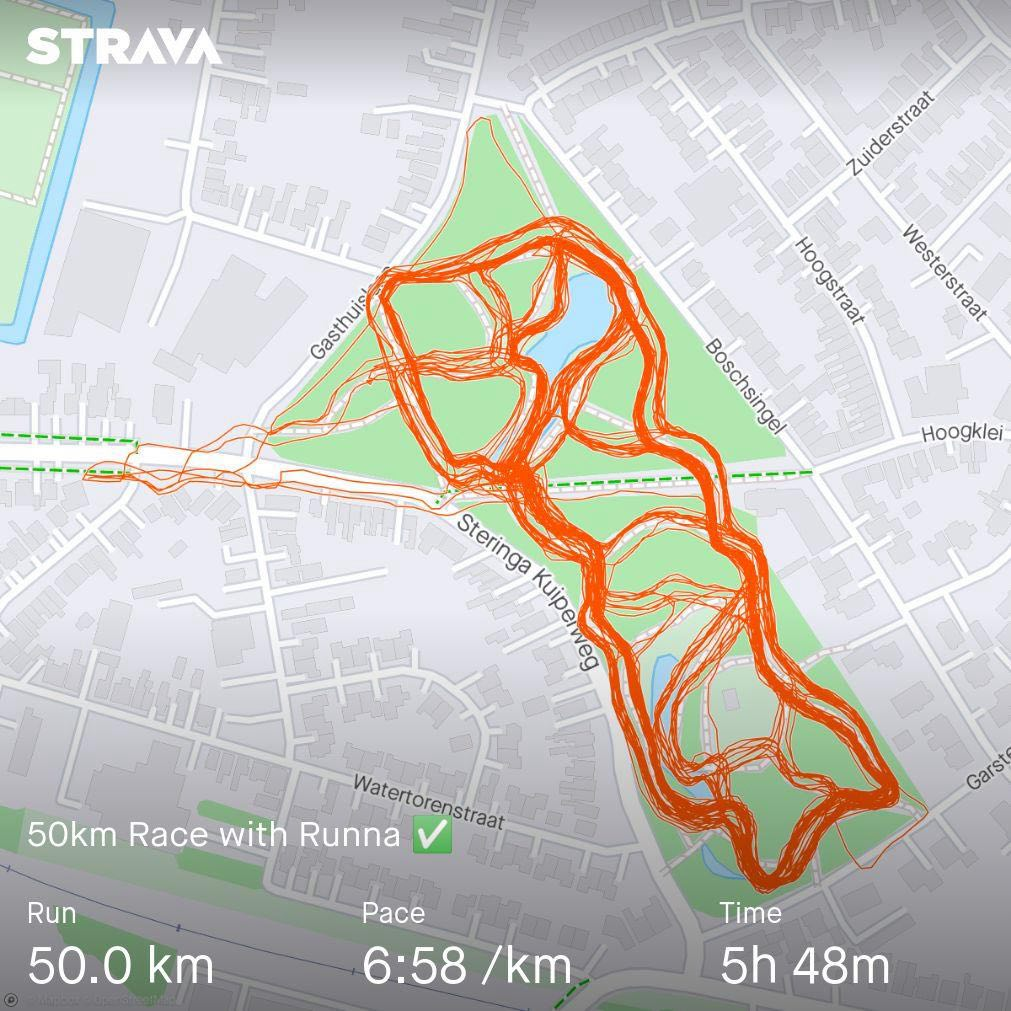
Race day! 🙌 50k done!
Run it on a relatively small park in front of my house. That way I could leave a backpack in the bushes with water and food as a “checkpoint”. Did 4 checkpoints, every 10k. The park is all trails with sharp turns and small hills, but even though small it made quite the difference, adding up to ~450m of elevation.
Nutrition and hydration
- Coconut water. Drunk ~2.5l. It’s great, although the flavor becomes a bit repulsive so I was drinking mostly water at the end.
- Ate around every 5k. See Week 10 for the breakdown
- 5 & 10k: hard boiled egg
- 15, 20 & 25k: sunflower seeds cracker
- 30 & 35k: 3 dates
- 33k (or 36?): caffeine shot
- 40k: 2 Ferrero Rocher
- 41 to 49k: 1 Ferrero Rocher on each kilometer
- 20 & 40k: salt pill
Didn’t feel any lack of energy or dehydration. I’m quite happy with this approach to nutrition.
Shoes
Nike Pegasus Trail 4 Gore-Tex.
Really comfortable. Relatively soft, good drop. Fit is roomy on the toe area but snug around midfoot and ankle. Didn’t experience any discomfort with them. Some blisters, but that’s expected on such distance.
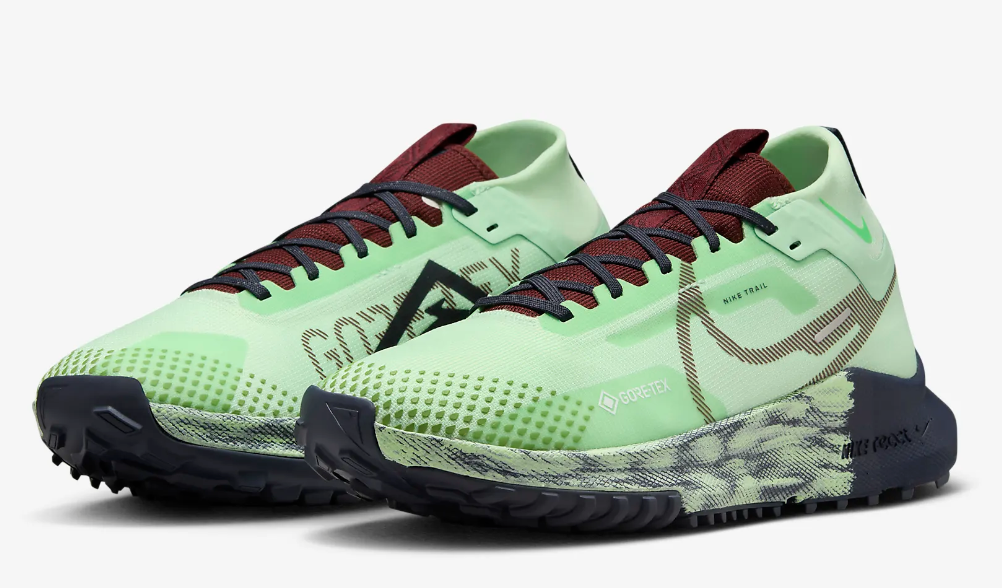
Mental aspect and performance
Definitely the hardest thing I’ve ever done.
From around the 20k mark I wanted to quit already. Pain in my feet was the main reason, started off quite strong on the arch of the right foot and became less intense but more even on the whole foot on both feet.
The last 5k were a grind. Walked the first ~200m of each kilometer.
The bottleneck was not so much the pain but rather the heart and breathing rates. Didn’t manage to do a Negative split, the second half was slower. Got to around 6:20 average pace and the slowed down to finish on a average 6:58 pace. Running on a 6:30 to 7:00 pace was relatively easy to maintain from the heart rate and breathing perspective but it was more painful to the legs than running on a faster pace (~5:30). Walking was even more painful, but helped a lot to recover the heart and breathing rates.
My aim was to do a ~6:00 average pace, so finishing at 6:58 wasn’t bad at all. Considering that I normally struggle to maintain an steady pace, even when running on flat surfaces my pace fluctuates by 30s to even 1min.
Rest period
I had around 10 weeks of rest between cycles. I continued with easy runs (~7-10k) and some trail running during the holidays in Spain and Italy ⛰️
I also participated on a 15k race event, Dwars Door Groningen, setting PRs for 5, 10 and 15k.
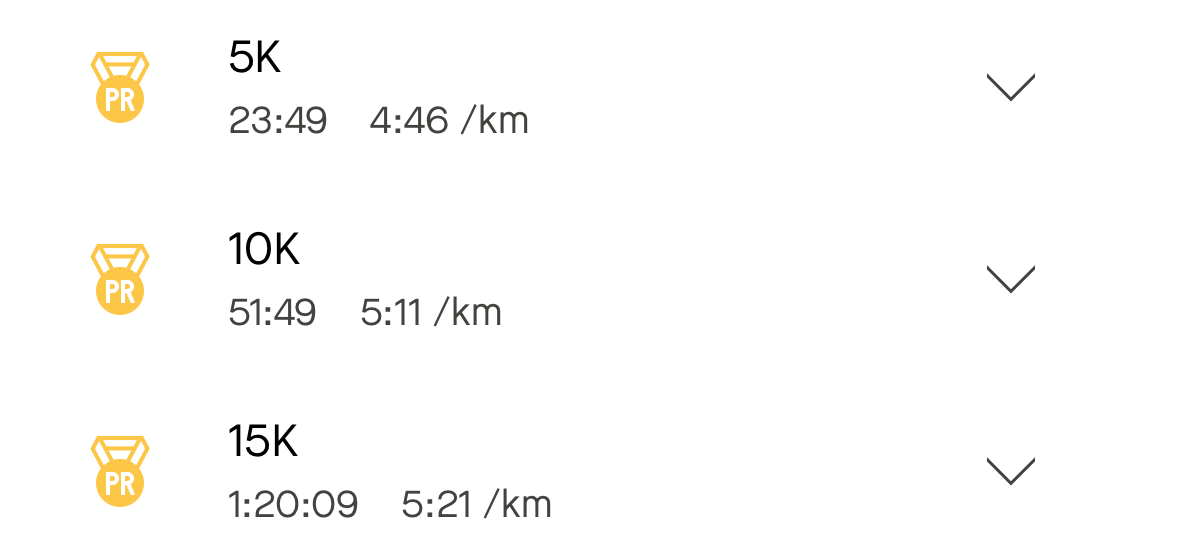
And lastly, I joined (informally) a Track and Field team with the goal to train for mid distance races (1500m and 5000m, maybe 10000m as well). I’m getting a great deal of feedback from the coach, since my form is trash.
2nd Cycle
A 16 weeks training cycle with Runna’s 110k plan. I chose the Elite option this time, since I had done the 50k cycle already.
Week 1
Back on schedule. 💪
Since the 110k race is a two days event, 60k and then 50k. The training plan includes two long runs some of the weekends.
18k and 12k this weekend.
Week 2
26k long run this weekend. Felt really hard for a couple of reasons:
- The heat (28 ºC) and humidity are annoying factors now in the summer. Even though The Netherlands has a relatively mild weather.
- Poor sleep. My sleep schedule was a mess the days before the run.
- Mental. I think this was the main reason
- Normally I’m quite motivated for long runs, but I was running (pun intended) low on motivation this time.
- Having accomplished the first big milestone, the 50k 1st Cycle, I feel like I’ve lost some of the hunger.
- Physical pain. Some pain in the legs, left foot, and right hip. Some of it went away once I was fully warmed up. But some remained throughout.
- Terrain. I run on the trails of a small forest (~800m loop) close by. Plenty of tight corners, elevation changes, and uneven paths.
Still I was able to do do a Negative split with no walking or pauses. 💪
Week 3
Long runs are actually long this time around. Besides race weekend, 8 weekends include a +30k run. Compared to only two the previous cycle. Went much better than the previous week though.
Week 4
Less volume this week. I’m still recovering from the longer runs of the previous weeks.
For the first time ever I couldn’t finish a run. It was the intervals workout for this week, 10x400m + 10x200m. I was till quite stiff after the warm up and wasn’t feeling well after the first couple of 400’s. Mostly pain on my calves, soleous, shins, and Achilles tendon.
Easy 15k on the weekend’s long run. Good for recovery.
Week 5
Set a PR for the 5k on this week’s tempo workout. Bouncing back strong from the “failure” of last week. And less than a minute short of my goal to run a sub 20min 5k.

The track is slowly becoming my favorite place to run. Seems monotonous at first, that makes it both a challenge, since it can get boring, and a blessing, because there’s no unexpected factors, it’s a nice, even, flat, and soft(er than road) surface.
I’ve plenty to improve regarding my form, but the progress I made so far is paying off. Skips (I do mostly A-skips so far) and tips from the coach are definitely helping.
38k long run to end the week. Average pace was 6:07/km, which is almost what I’d like to have on the race. Recovery is becoming easier, this is key as volume increases drastically.
Week 6
Recovery is becoming easier, that didn’t age well. Had back to back long runs, half marathon and 25k planned, which I had to push to the beginning of the next week. Mainly because I wasn’t feeling fully recovered.
Thinking about changing the plan. 3-4 runs a week, with very long runs on the weekend isn’t working that well. I go too hard on the tempo/fast workouts on the track during the week and then I’m not fully recovered for the next weekend.
Weeks 7 and 8
Skipped the long runs these two weeks, due to the recovery issues I mentioned last week. Plan was a marathon (week 7) and then just 16k for a recovery week (week 8).
Week 9
Trying out a new plan this week: daily long-ish runs (15k) from Monday to Friday.
The new goal is to increase the volume by adding more days, rather than longer runs on the weekends. I already know I can do long a** 5-6hs run. What I’m not used to is the weekly volume. Also, I’m trying to stay as close to Zone 2 as possible for most runs (80-20 split).
75k is the most I’ve run on a week so far. Felt good. Fatigue carries to the following days, and slowly accumulates over the week, but still all the runs were relatively comfortable.
Week 10
Recovery week. A few 5ks.
Week 11
Matched a similar volume as the race by doing 21k x 5.
Day 3 was the hardest, from there on it seems like the body accepts the fact that you are doing long runs every day stops complaining.
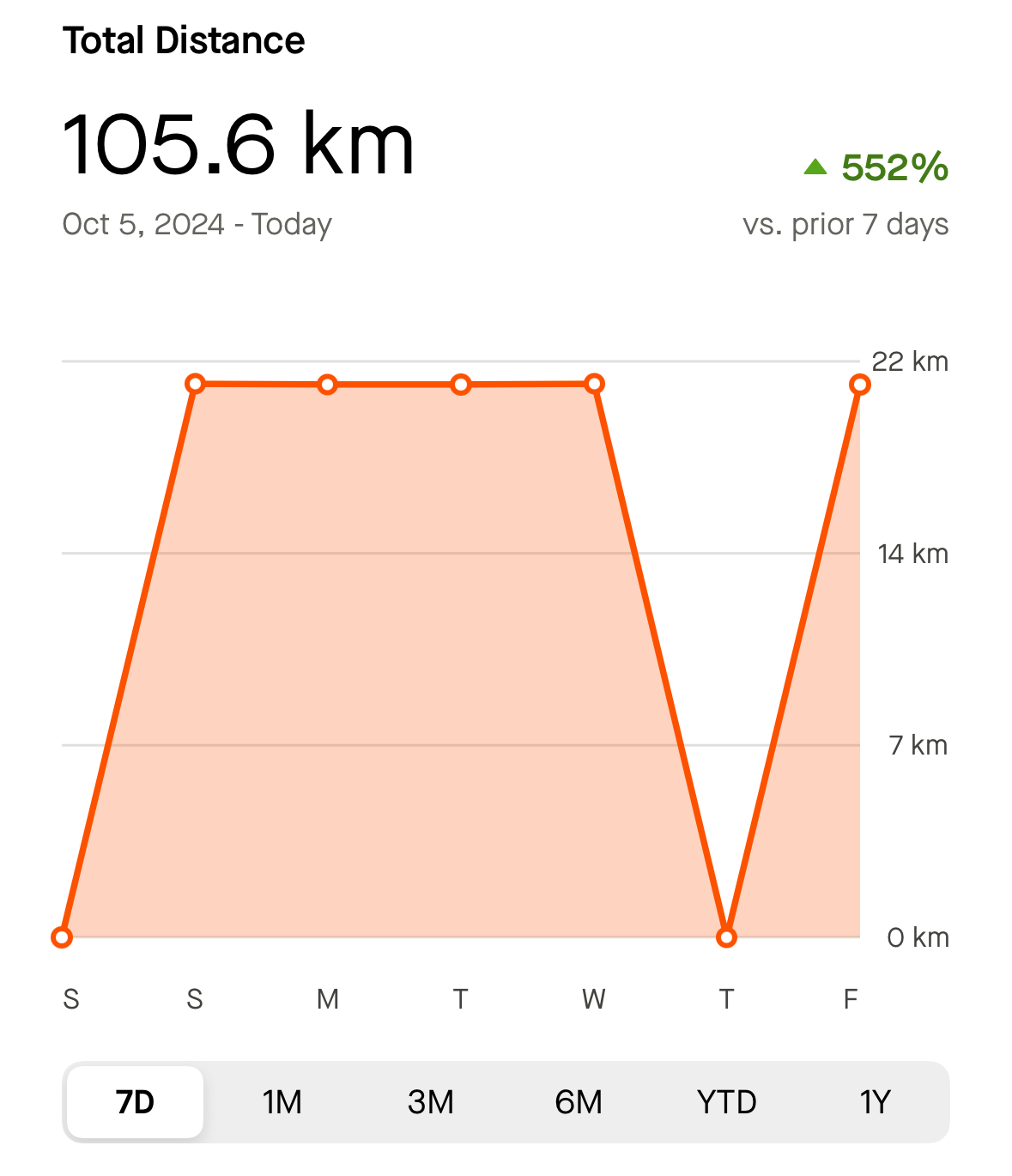
Week 12 and 13
Recovery and speed work from these two weeks.
I need to do a better job at differentiating easy runs (ie. zone 2) and speed workouts.
Week 14
Traveled to Spain to visit family. Spent the two weeks before the race here. Which means I got to do some good trail runs (10 and 30k) this week, with elevation and similar terrain that I’d get on Morocco. Which is impossible in The Netherlands.
Not only elevation but also the terrain (a bit more technical) greatly impact pace.
For the 10k, 257m of elevation gain, I was able to maintain a good 6:08 / km pace. But for the 30k, 756m of elevation gain, I couldn’t keep such pace and ended up with an average of 6:39 / km.
Week 15
Recovery week. Only leg workout at the gym, no running.
Week 16 ~ 110k Race Day
📷s on Instagram
Nutrition and hydration
- Gels and bars every ~6-8k
- 1 lt every ~10k.
- 500ml of water
- 500ml of electrolytes
- On checkpoint 4 there was banana and Coke. That was a blessing!
- Gels with caffeine around the ~40k mark on day two
- Sugar dense (ie. Snickers bar) for the last 30min to 1hr
All the experimentation during training paid of. I think I managed to find the sweet spot for mixing energy sources, amount, hydration, etc. I didn’t feel any lack of energy at all.
Shoes
The same trail ones I used for the 50k Week 16 ~ 50k Race Day > Shoes.
I’m tempted to get the same ones next time because of how comfortable they feel to me. The only worry is I might be stuck in a local maximum when there’s definitely even better pairs out there.
Mental aspect
The culmination of 1800km of running since past October (2023) when I went for my first 5k. I had run before that, but not consistently at all. And 1550km since January when I signed up for the race.
I had a pretty good picture of the mental resilience it would take to finish it. Goggins’ book, ultra runners’ interviews, and my own long runs had already prepared me. And yet, out there in the desert, through rocky terrain, a never ending succession of ascends and descends, I truly learned how difficult it was. Each time I walked up hill was a blessing, a moment to rest, and the only thing that managed to get me started again to continue running was repeating to myself the phrase Mind over matter!
Tomorrow, same time? And that was only the first day. I had to do it all over again the next day. I still don’t know how I managed to pull through. It was hard as hell to finish.
The second day I run with a friend, that helped a lot. Crossing the line together of our first ultramarathon was a once-in-a-lifetime moment.
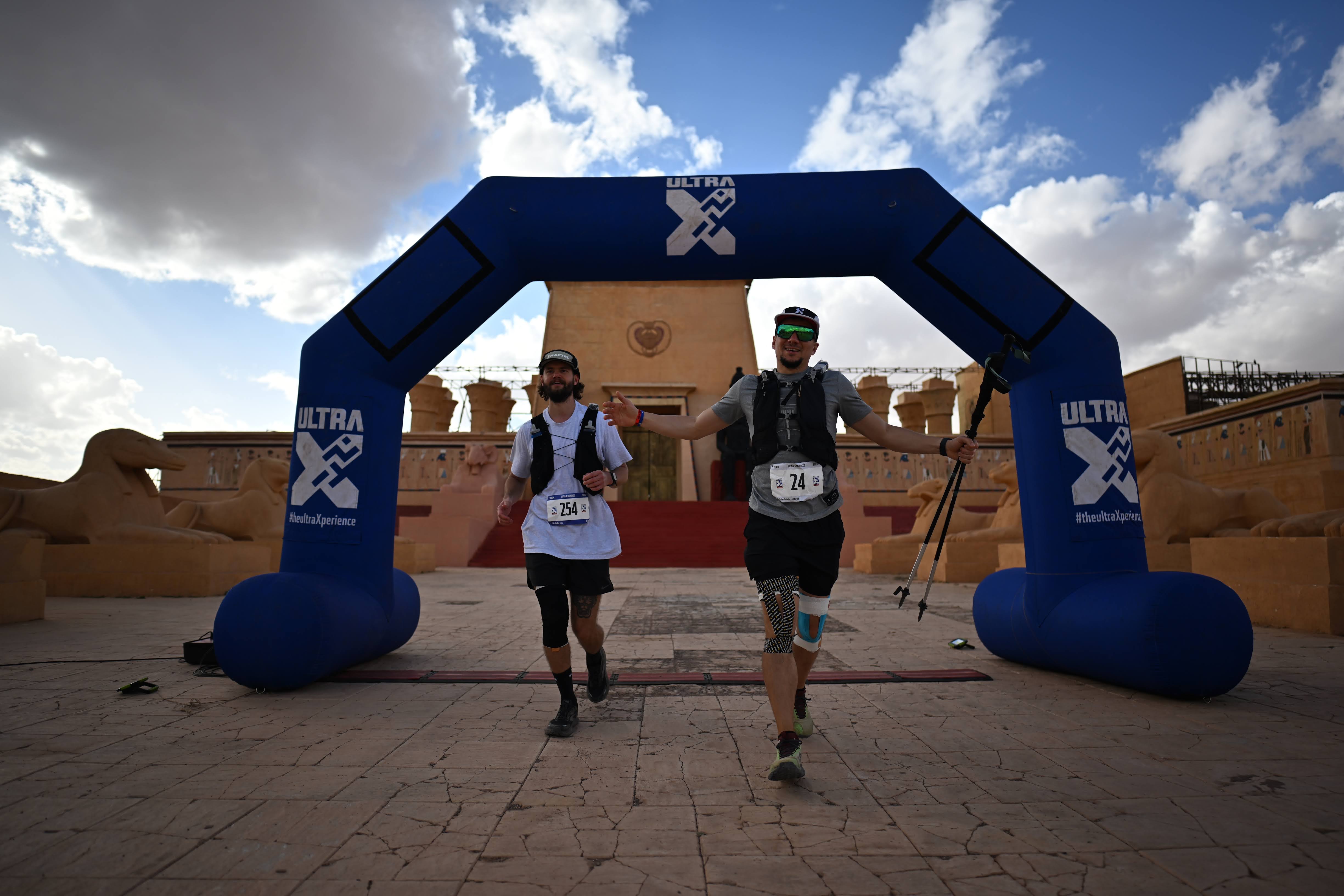
Performance
| Distance | Official race time | Moving time on Strava | |
|---|---|---|---|
| Day 1 | 61km | 9:01:18 ~ 8:51 / km | 8:03:51 ~ 7:55 / km |
| Day 2 | 51km | 8:18:55 ~ 9:45 / km | 6:45:44 ~ 7:56 / km |
Main points of improvement are:
- Being more efficient with stops overall, specially at checkpoints.
- Walk less, or ideally not at all. Even on hills it should be possible, specially when the incline is not as pronounced.
- More (rocky) trail training.
- More strength training, focused on ankles/feet strength and running motions.